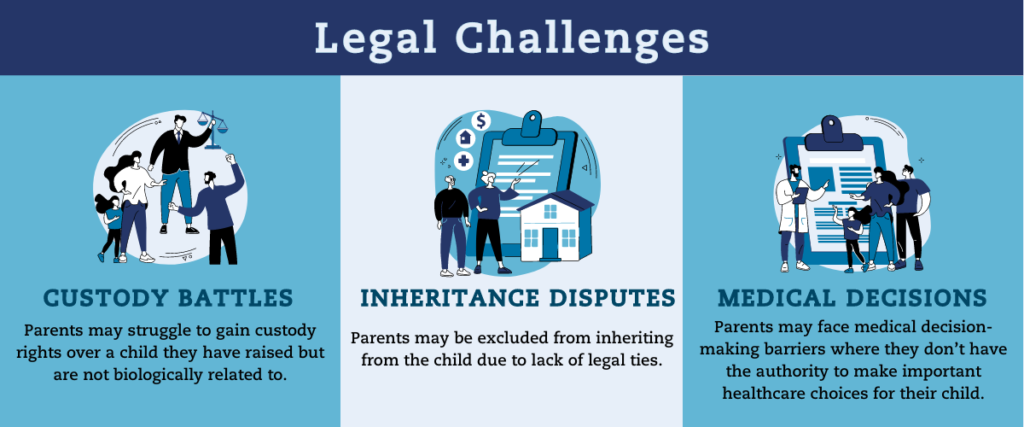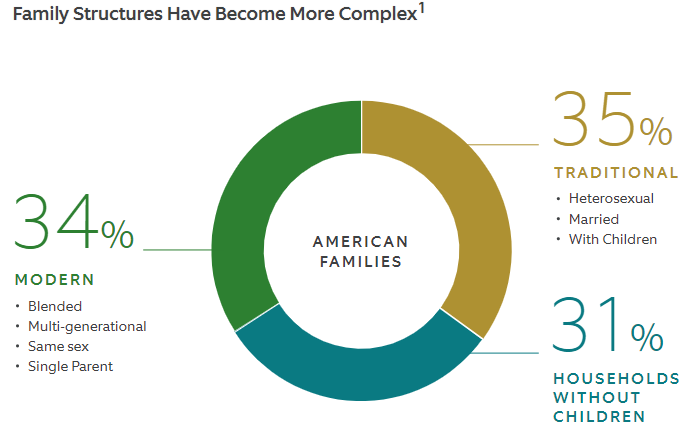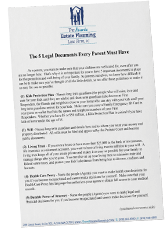
In today’s diverse society, the concept of family extends far beyond traditional biological ties. Non-biological parents, including stepparents, LGBTQ+ parents, and adoptive parents, play a vital role in nurturing and raising children.
However, your families often face unique legal challenges that can jeopardize your parent-child relationship.
Estate planning for blended families safeguards your rights and ensures your children are protected, both emotionally and financially. Without proper planning, non-biological parents may encounter obstacles in making critical decisions, inheriting assets, or even maintaining custody of your children.
Blended families are becoming more of the norm. For example, according to data from Pew Research Center, approximately 16% of children under 18 in the United States live in blended families with a biological parent and a stepparent.
While these diverse family structures are increasingly common, the legal landscape has not always kept pace. This article delves into the complexities faced by non-traditional families and provides strategies to navigate the legal landscape, ensuring your parent-child bond is protected.
Legal Status of Non-Biological Parents
The bond between a non-biological parent and their child is a sacred one, nurtured through countless moments of love, guidance, and unwavering commitment. However, the legal system often fails to automatically recognize and protect these cherished relationships.
In many states, non-biological parents may lack inherent legal rights over their children, leaving them vulnerable in situations that could tear families apart, such as custody battles, inheritance disputes, and even medical emergencies.
Imagine the heartbreak of being denied the ability to make critical healthcare decisions for your child or losing custody and visitation rights simply because the law does not recognize the depth of your parental bond.
For a non-biological parent who has lovingly raised their spouse’s child from infancy, the thought of being legally barred from inheriting or providing for that child without explicit documentation is a devastating prospect.

Karen’s Story
Karen went through a lengthy and painful legal battle to be recognized as the legal parent of her two children, despite being their non-biological parent. Karen and her former partner Julie had the children through assisted reproductive technology while living in Florida. Karen was present for their births and took on all parental duties as a second mom.
However, when the couple later separated after moving to Massachusetts, Julie refused to allow Karen to adopt the children. Karen had to file legal complaints seeking to be declared a “de facto” parent and then a legal parent. After an agonizing three-year court battle, Karen finally won the right to legally parent her children.
Karen’s story highlights the challenges non-biological parents can face in being recognized legally, even when they have raised the children from birth. The years of uncertainty took an emotional toll on Karen and her children, not to mention the significant legal fees.
As Karen states, “Children shouldn’t suffer any uncertainty at all about who their parents are.” Her case underscores the need for laws that enshrine equality and security for all families.
Karen’s heartbreaking story serves as a poignant reminder of the challenges non-biological parents can face in being legally recognized as parents, even when they have nurtured and loved their children from birth.
The years of uncertainty and emotional turmoil she endured underscore the urgent need for proactive measures to safeguard the sacred bond between non-biological parents and their children.
While the legal landscape can be complex, there are estate planning strategies that can provide a robust framework for protecting your family’s future. By taking proactive steps, you can solidify your parental rights and responsibilities, ensuring that your cherished bonds and values are safeguarded for generations to come.
Estate Planning Strategies for Non-Biological Parents
Research done by Hugh Magill, Former Vice Chairman at Northern Trust, shows how family structures have evolved and how this complexity has led to lack of planning for those families.

Wills and Trusts
One of the most powerful tools in a non-biological parent’s estate planning arsenal is the creation of wills and trusts. Through a carefully crafted will, non-biological parents can nominate a guardian to care for their minor children in the event of their incapacity or death.
This crucial step ensures that the children are placed in the custody of a trusted individual who shares the parents’ values and can provide a loving, stable environment.
Additionally, wills allow non-biological parents to provide for their children financially by designating them as beneficiaries of their assets and inheritance. Trusts can further bolster this financial security by establishing a structured mechanism for managing and distributing assets for the children’s benefit. benefit.
While wills and trusts are essential components, a comprehensive estate plan often requires additional legal documents to fully protect your family’s interests.
Other Legal Documents
In addition to wills and trusts, non-biological parents should consider executing other legal documents to reinforce their parental rights and responsibilities. A power of attorney can grant a designated individual the authority to make legal decisions on behalf of the children, ensuring their affairs are properly managed.
Similarly, a healthcare proxy empowers a trusted person to make medical decisions for the children if the parents are incapacitated or unavailable. These documents provide an additional layer of protection, ensuring the children’s well-being is never compromised.
Additional Considerations
Comprehensive estate planning for non-biological parents extends beyond just legal documents.
It’s crucial to review and update beneficiary designations on life insurance policies, retirement accounts, and other assets to ensure that children are properly provided for. Re-titling assets as joint or community property can also help solidify the children’s claims to inheritance and avoid potential disputes.
Non-traditional family situations may require additional planning considerations. For example, providing clear instructions for roles and responsibilities of multiple parental figures, such as step-parents, donors, or surrogates, can help mitigate future conflicts.
Likewise, addressing the unique dynamics of blended families or LGBTQ+ relationships (add link to LGBTQ+ article) can ensure that the estate plan accurately reflects the family’s wishes and protects the interests of all involved parties.
By taking a holistic approach and addressing these additional factors, non-biological parents can create a comprehensive estate plan that leaves no stone unturned, safeguarding their children’s futures and preserving the integrity of their family unit.
The Emotional Aspect
While estate planning for non-biological parents is primarily a legal endeavor, it also carries profound emotional significance.
By formalizing the parent-child bond through legally binding documentation, non-biological parents can solidify their commitment to their children and ensure that their wishes for their care and upbringing are respected.
This process not only provides peace of mind but also serves as a tangible expression of love and devotion.
Comprehensive estate planning can help avoid potential family conflicts or legal battles that could strain relationships and cause emotional turmoil for the children.
By clearly outlining their desires and establishing a framework for decision-making, non-biological parents can minimize the risk of disputes and ensure that their children are cared for according to their values and principles

Working with an Attorney
While estate planning for non-biological parents can be a complex and emotionally charged process, seeking professional legal guidance is essential. An experienced estate planning attorney can navigate the intricate web of laws and regulations, ensuring that all necessary documents are properly executed and tailored to the specific needs of the family.
When selecting an attorney, it is crucial to prioritize experience and expertise in handling non-traditional family structures.
An attorney well-versed in the nuances of estate planning for non-biological parents can provide invaluable insights and strategies specific to the family’s unique circumstances. This personalized approach is vital, as no two families are alike, and a one-size-fits-all solution may fail to protect your family.
Safeguard Your Family's Legacy Today
For non-biological parents, the journey of creating and nurturing a family is often filled with unique challenges and complexities. However, by embracing comprehensive estate planning, you can navigate this legal landscape with confidence, ensuring your cherished bonds and values are safeguarded for generations to come.
The strategies we discussed, including wills, trusts, and powers of attorney, provide a robust framework for solidifying your parental rights and responsibilities. By taking proactive steps, you can secure your children’s futures, both emotionally and financially, and mitigate the risk of potential conflicts or legal battles that could strain family relationships.
Estate planning for non-biological parents transcends mere legal formalities. It represents a profound act of love and commitment, formalizing the unbreakable bond between parent and child and ensuring that your family’s wishes are respected, even in the face of life’s uncertainties.
Do not let uncertainty or legal complexities jeopardize the legacy you have built for your family. Take the first step today by scheduling a consultation with our experienced estate planning attorneys, who specialize in non-traditional family dynamics.
Together, we will craft a customized plan that accounts for your unique goals, values, and legal considerations, leaving no stone unturned in protecting your family’s future.
By working with our dedicated team, you can rest assured that the love, sacrifice, and life lessons you have poured into your family will endure, shielded from the uncertainties of tomorrow.
Your family deserves nothing less than the utmost protection and peace of mind that a well-crafted estate plan can provide. Take the first step today and secure your family’s legacy for years to come.














